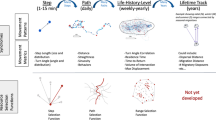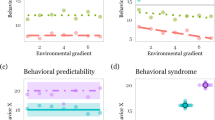Abstract
Patterns of discrete behaviors tied together in specific sequences are essential for the formation of complex behavioral phenomena. Such behavioral sequences can be of critical ecological importance, for example relating to resource acquisition, predator evasion, and sexual selection. The role of sequential behaviors in ecology, however, is understudied, in substantial part due to the difficulty of quantifying complex sequences. Here, we present a modified version of determinism (DET) from recurrence quantification analysis (RQA) as a standard metric for quantifying sequential behaviors. We focus on a case study of trapline foraging, a taxonomically widespread behavioral strategy in which animals repeatedly visit spatially fixed resources in a predictable order. Using a bumble bee movement dataset, we demonstrate how to calculate DET and create and interpret recurrence plots, which visually demonstrate patterns in foraging sequences. We show a new method for statistical comparisons of DET scores and assess the sensitivity of DET to resource density using simulated foraging sequences. We find that DET complements and offers distinct advantages over previously available methods for many questions and datasets since it does not depend on any particular resource arrangement or experimental setup and is relatively insensitive to resource density. These features make DET a powerful tool for comparing sequential behaviors between differing environments in a range of ecologically important contexts.




Similar content being viewed by others
References
Ackerman JD, Mesler MR, Lu KL, Montalvo AM (1982) Food-foraging behavior of male Euglossini (Hymenoptera: Apidae): vagabonds or trapliners? Biotropica 14:241–248. doi:10.2307/2388080
Barske J, Schlinger BA, Wikelski M, Fusani L (2011) Female choice for male motor skills. Proc R Soc B 278:3523–3528. doi:10.1098/rspb.2011.0382
Berridge KC, Aldridge JW, Houchard KR, Zhuang X (2005) Sequential super-stereotypy of an instinctive fixed action pattern in hyper-dopaminergic mutant mice: a model of obsessive compulsive disorder and Tourette's. BMC Biol 3:4. doi:10.1186/1741-7007-3-4
Caraco T (1982) Flock size and the organization of behavioral sequences in juncos. Condor 84:101–105. doi:10.2307/1367829
Champion RA, Rutter SM, Penning PD, Rook AJ (1994) Temporal variation in grazing behaviour of sheep and the reliability of sampling periods. Appl Anim Behav Sci 42:99–108. doi:10.1016/0168-1591(94)90150-3
Chase ID (1982) Behavioral sequences during dominance hierarchy formation in chickens. Science 216:439–440. doi:10.1126/science.216.4544.439
Deygout C, Gault A, Sarrazin F, Bessa-Gomes C (2009) Modeling the impact of feeding stations on vulture scavenging service efficiency. Ecol Model 220:1826–1835. doi:10.1016/j.ecolmodel.2009.04.030
Eckmann JP, Kamphorst SO, Ruelle D (1987) Recurrence plots of dynamical systems. Europhys Lett 4:973–977. doi:10.1209/0295-5075/4/9/004
Fentress JC, Stilwell FP (1973) Grammar of a movement sequence in inbred mice. Nature 244:52–53. doi:10.1038/244052a0
Garber PA (1988) Foraging decisions during nectar feeding by tamarin monkeys (Saguinus mystax and Saguinus fuscicollis, Callitrichidae, Primates) in Amazonian Peru. Biotropica 20:100–106. doi:10.2307/2388181
Garrison JSE, Gass CL (1999) Response of a traplining hummingbird to changes in nectar availability. Behav Ecol 10:714–725. doi:10.1093/beheco/10.6.714
Gass CL, Garrison JSE (1999) Energy regulation by traplining hummingbirds. Funct Ecol 13:483–492. doi:10.1046/j.1365-2435.1999.00335.x
Gilbert LE, Singer MC (1975) Butterfly ecology. Annu Rev Ecol Syst 6:365–395. doi:10.1146/annurev.es.06.110175.002053
Gill FB (1988) Trapline foraging by hermit hummingbirds: competition for an undefended, renewable resource. Ecology 69:1933–1942. doi:10.2307/1941170
Gould E (1978) Foraging behavior of Malaysian nectar-feeding bats. Biotropica 10:184–193. doi:10.2307/2387904
Jin X, Tecuapetla F, Costa RM (2014) Basal ganglia subcircuits distinctively encode the parsing and concatenation of action sequences. Nat Neurosci 17:423–430. doi:10.1038/nn.3632
Kristan WB (2014) Behavioral sequencing: competitive queuing in the fly CNS. Curr Biol 24:R743–R746. doi:10.1016/j.cub.2014.06.071
Lemke TO (1984) Foraging ecology of the long-nosed bat, Glossophaga soricina, with respect to resource availability. Ecology 65:538–548. doi:10.2307/1941416
Lihoreau M, Chittka L, Raine NE (2010) Travel optimization by foraging bumblebees through readjustments of traplines after discovery of new feeding locations. Am Nat 176:744–757. doi:10.1086/657042
Lihoreau M, Chittka L, Raine NE (2011) Trade‐off between travel distance and prioritization of high‐reward sites in traplining bumblebees. Funct Ecol 25:1284–1292. doi:10.1111/j.1365-2435.2011.01881.x
Lihoreau M, Chittka L, Le Comber SC, Raine NE (2012a) Bees do not use nearest-neighbour rules for optimization of multi-location routes. Biol Lett 8:13–16. doi:10.1098/rsbl.2011.0661
Lihoreau M, Raine NE, Reynolds AM et al (2012b) Radar tracking and motion-sensitive cameras on flowers reveal the development of pollinator multi-destination routes over large spatial scales. PLoS Biol 10, e100139. doi:10.1371/journal.pbio.1001392
Lorenz K, Tinbergen N (1970) Taxis and instinctive behaviour pattern in egg-rolling by the Greylag goose. In: Studies in animal and human behavior. Harvard University Press, Cambridge pp 316–350. doi: 10.4159/harvard.9780674430389.c6
Marwan N, Wessel N, Meyerfeldt U, Schirdewan A, Kurths J (2002) Recurrence-plot-based measures of complexity and their application to heart-rate-variability data. Phys Rev E 66:026702. doi:10.1103/physreve.66.026702
Marwan N, Carmen Romano M, Thiel M, Kurths J (2007) Recurrence plots for the analysis of complex systems. Phys Rep 438:237–329. doi:10.1016/j.physrep.2006.11.001
Maubourguet N, Lesne A, Changeux J-P, Maskos U, Faure P (2008) Behavioral sequence analysis reveals a novel role for ß2* nicotinic receptors in exploration. PLoS Comput Biol 4, e1000229. doi:10.1371/journal.pcbi.1000229
Melamed O, Gerstner W, Maass W, Tsodyks M, Markram H (2004) Coding and learning of behavioral sequences. Trends Neurosci 27:11–14. doi:10.1016/j.tins.2003.10.014
Ohashi K, Thomson JD (2009) Trapline foraging by pollinators: its ontogeny, economics and possible consequences for plants. Ann Bot 103:1365–1378. doi:10.1093/aob/mcp088
Ohashi K, Thomson JD, D'Souza D (2007) Trapline foraging by bumble bees: IV. Optimization of route geometry in the absence of competition. Behav Ecol 18:1–11. doi:10.1093/beheco/arl053
Ohashi K, Leslie A, Thomson JD (2008) Trapline foraging by bumble bees: V. Effects of experience and priority on competitive performance. Behav Ecol 19:936–948. doi:10.1093/beheco/arn048
Porrello A, Soddu S, Zbilut JP, Crescenzi M, Giuliani A (2004) Discrimination of single amino acid mutations of the p53 protein by means of deterministic singularities of recurrence quantification analysis. Proteins 55:743–755. doi:10.1002/prot.20075
R Core Team (2014) R: a language and environment for statistical computing. R Foundation for Statistical Computing, Vienna URL http://www.R-project.org/
Reynolds AM, Lihoreau M, Chittka L (2013) A simple iterative model accurately captures complex trapline formation by bumblebees across spatial scales and flower arrangements. PLoS Comput Biol 9, e1002938. doi:10.1371/journal.pcbi.1002938
Rhodes BJ, Bullock D, Verwey WB, Averbeck BB, Page M (2004) Learning and production of movement sequences: behavioral, neurophysiological, and modeling perspectives. Hum Mov Sci 23:699–746. doi:10.1016/j.humov.2004.10.008
Sabine JB, Meyers JM, Moore CT, Schweitzer SH (2008) Effects of human activity on behavior of breeding American oystercatchers, Cumberland Island National Seashore, Georgia, USA. Waterbirds 31:70–82. doi:10.1675/1524-4695(2008)31[70:eohaob]2.0.co;2
Saleh N, Chittka L (2007) Traplining in bumblebees (Bombus impatiens): a foraging strategy’s ontogeny and the importance of spatial reference memory in short-range foraging. Oecologia 151:719–730. doi:10.1007/s00442-006-0607-9
Sokal RR (1991) Ancient movement patterns determine modern genetic variances in Europe. Hum Biol 84:535–552. doi:10.3378/027.084.0504
Tello-Ramos MC, Hurly TA, Healy SD (2015) Traplining in hummingbirds: flying short-distance sequences among several locations. Behav Ecol 1-8 doi: 10.1093/beheco/arv014
Temeles EJ, Shaw KC, Kudla AU, Sander SE (2006) Traplining by purple-throated carib hummingbirds: behavioral responses to competition and nectar availability. Behav Ecol Sociobiol 61:163–172. doi:10.1007/s00265-006-0247-4
Thomasson N, Hoeppner TJ, Webber CL Jr, Zbilut JP (2001) Recurrence quantification in epileptic EEGs. Phys Lett A 279:94–101. doi:10.1016/s0375-9601(00)00815-x
Thomson JD, Slatkin M, Thomson BA (1997) Trapline foraging by bumble bees: II. Definition and detection from sequence data. Behav Ecol 8:199–210. doi:10.1093/beheco/8.2.199
Trulla LL, Giuliani A, Zbilut JP, Webber CL Jr (1996) Recurrence quantification analysis of the logistic equation with transients. Phys Lett A 223:255–260. doi:10.1016/s0375-9601(96)00741-4
Vaudo AD, Patch HM, Mortensen DA, Grozinger CM, Tooker JF (2014) Bumble bees exhibit daily behavioral patterns in pollen foraging. Arthropod-Plant Interact 8:273–283. doi:10.1007/s11829-014-9312-5
Waterman MS (1989) Mathematical methods for DNA sequences. CRC Press, Boca Raton
Webber CL Jr, Zbilut JP (1996) Assessing deterministic structures in physiological systems using recurrence plot strategies. In: Khoo MCK (ed) Bioengineering approaches to pulmonary physiology and medicine. Plenum Press, New York, pp 137–148. doi:10.1007/978-0-585-34964-0_8
Wiens JA, Martin SG, Holthaus WR, Iwen FA (1970) Metronome timing in behavioral ecology studies. Ecology 51:350–352. doi:10.2307/1933679
Williams JB, Anderson MD, Richardson PRK (1997) Seasonal differences in field metabolism, water requirements, and foraging behavior of free-living aardwolves. Ecology 78:2588–2602. doi:10.2307/2265916
Woodsworth GC, Bell GP, Fenton MB (1981) Observations of the echolocation, feeding behaviour, and habitat use of Euderma maculatum (Chiroptera: Vespertilionidae) in southcentral British Columbia. Can J Zool 59:1099–1102. doi:10.1139/z81-152
Wooller RD, Richardson KC, Bradley GO (1999) Dietary constraints upon reproduction in an obligate pollen-and nectar-feeding marsupial, the honey possum (Tarsipes rostratus). J Zool 248:279–287. doi:10.1017/s0952836999007013
Wuertz D et al (2013) fNonlinear: nonlinear and chaotic time series modelling. R package version 3010.78 http://CRAN.R-project.org/package=fNonlinear
Yang J-Y, Peng Z-L, Yu Z-G, Zhang R-J, Anh V, Wang D (2009) Prediction of protein structural classes by recurrence quantification analysis based on chaos game representation. J Theor Biol 257:618–626. doi:10.1016/j.jtbi.2008.12.027
Zbilut JP, Webber CL Jr (1992) Embeddings and delays as derived from quantification of recurrence plots. Phys Lett A 171:199–203. doi:10.1016/0375-9601(92)90426-m
Zbilut JP, Giuliani A, Webber CL, Colosimo A (1998) Recurrence quantification analysis in structure-function relationships of proteins: an overview of a general methodology applied to the case of TEM-1 beta-lactamase. Protein Eng 11:87–93. doi:10.1093/protein/11.2.87
Zbilut JP, Sirabella P, Giuliani A, Manetti C, Colosimo A, Webber CL Jr (2002a) Review of nonlinear analysis of proteins through recurrence quantification. Cell Biochem Biophys 36:67–88. doi:10.1385/cbb:36:1:67
Zbilut JP, Thomasson N, Webber CL (2002b) Recurrence quantification analysis as a tool for nonlinear exploration of nonstationary cardiac signals. Med Eng Phys 24:53–60. doi:10.1016/s1350-4533(01)00112-6
Acknowledgments
This work was funded by the US National Science Foundation (Award # DEB-1120572 to B. Brosi). This work was assisted by the Short-term Visitor program (to CAA and to BJB) of the National Institute for Mathematical and Biological Synthesis, an institute sponsored by the National Science Foundation through NSF Award #DBI-1300426, with additional support from The University of Tennessee, Knoxville. We thank Mary Bushman and two anonymous reviewers for their constructive comments on the manuscript.
Author information
Authors and Affiliations
Corresponding author
Additional information
Communicated by D. Naug
Electronic supplementary material
Below is the link to the electronic supplementary material.
ESM 1
(DOCX 118 kb)
Rights and permissions
About this article
Cite this article
Ayers, C.A., Armsworth, P.R. & Brosi, B.J. Determinism as a statistical metric for ecologically important recurrent behaviors with trapline foraging as a case study. Behav Ecol Sociobiol 69, 1395–1404 (2015). https://doi.org/10.1007/s00265-015-1948-3
Received:
Revised:
Accepted:
Published:
Issue Date:
DOI: https://doi.org/10.1007/s00265-015-1948-3




